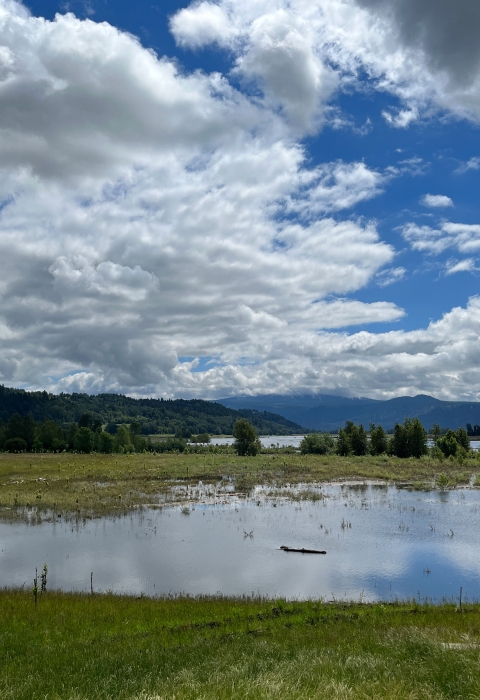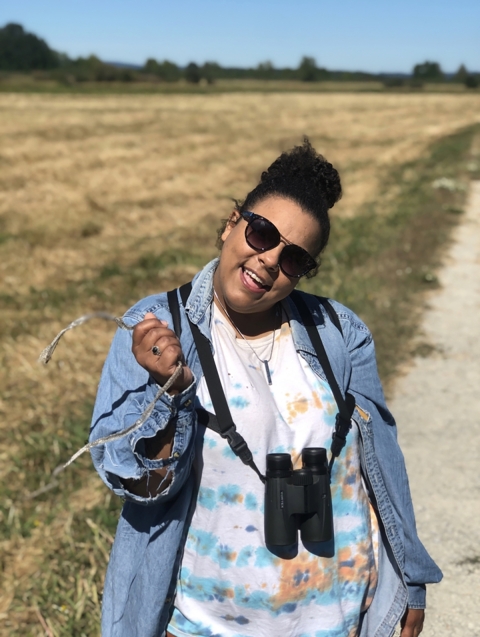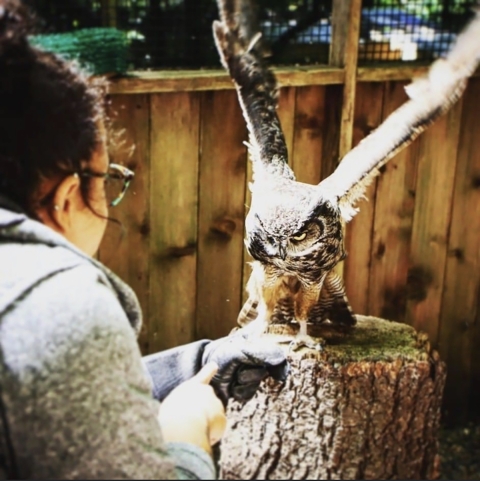The timing for Sam DeJarnett to launch a new birding program could not be better. The host of the podcast “Always Be Birdin’” is leading her first as part of the monthly Flocking to Nature: Birdin’ Around PDX program as Black Birders Week takes flight and World Migratory Bird Month enjoys its last week.
As this yearlong project designed specifically for people of color prepared for takeoff, DeJarnett took time to chat about herself, about birding and why it is so important for birding and conservation efforts in general be more inclusive.
Q: Tell us a little about yourself and how you found your way to birding.
A: Most of my career experience has been working with animals. One of my favorite jobs was in wildlife rehabilitation. I was introduced to it in college back in Ohio, where I’m from. From there, I landed a job at Bird Alliance of Oregon (previously Portland Audubon) where I was introduced to bird watching, or birding. I knew about birds but I never knew that going out and looking for different species was a thing, and after my first birding outing with coworkers, I realized that it was one of the more fun things I had done in a long time.
A bald eagle at Steigerwald Lake National Wildlife Refuge skimming the surface of the water to chase a male mallard duck gave me an intense moment of awe, joy and excitement that would lead to learning more about all the species of birds I could find.
Q: What is it about birds that you find so interesting?
A: The more people I meet who have no idea birding is a thing also seem to forget that birds even exist. This is something I always find amusing because I understand if you aren’t aware of birds, they are easy to overlook. But once you become attuned to birds, nature really does erupt around you in a symphony of chirps and calls. Birds are an easy way to connect with nature. Their behaviors spark curiosity, making us want to know more about the why and the how.
I think birds are a unique way to learn about the world around us.
Q: What sparked your idea for a podcast?
A: My podcast was born of an accumulation of things, but mostly from the unrest of my community during the 2020 Black Lives Matter protests and an incident in New York City’s Central Park involving a Black birder who asked a white woman to leash her dog. The conflict added to national discussions regarding race and led to a group of Black birders, Black AF in STEM, to create Black Birders Week. That was the catalyst for dropping my first episode.
As I began birding, I noticed how white the activity can be and how uncomfortable I felt in those spaces. When Black AF in STEM hosted the first Black Birders Week, I knew one Black birder. After that week, I was introduced to many, many more across the country. I thought it was extremely important to provide a platform for Black, brown and indigenous birders everywhere to discuss and showcase the joy birding brings them, create community and really peel back the layers of how racism shows up in birding and conservation.
The “Always Be Birdin’” podcast was launched in August 2020 and has been very successful since. With almost 18,000 downloads worldwide, it has awarded me many opportunities and allowed me to provide for my community in ways I never thought possible. The podcast is extremely important to me and is something I hope has a lot more to give in years to come.
Q: Tell us about your podcast! What are some of the topics you explore?
A: It is mostly an interview-based podcast in which I bring on everyday Black, brown and indigenous birders to discuss whatever it is they want to discuss. Some of the episode topics range from an interview with National Audubon’s new employees’ union representative to discussion around how old conservation ideas exclude people of color.
Q: You’re getting ready to launch a yearlong series of monthly bird outings designed for the people of color. How did this come about?
A: The U.S. Fish and Wildlife Service contacted me in 2021 after coming across my work with the podcast and my Instagram account. People at the Service were interested in having me advise them on how best to connect with the Black and brown communities in Portland and what kind of programming would be best for this. From there, we have developed a lovely relationship and I have now led many birding outings in partnership with them over the years for the Black and brown communities. I have thoroughly enjoyed working closely with Nanette Seto, chief of the Pacific Region’s Migratory Bird Program, in particular. We have wanted to get a consistent series going for a long time and we are both very excited to launch this yearlong series after so long!
Q: What can birders expect from the Flocking to Nature: Birdin’ Around PDX series?
A: Joy and community. It’s very simple. My birding outings are first and foremost ways for our communities to connect and engage in nature together for the purposes of learning, healing and experiencing joy. We just happen to be looking for really, really cool birds.
Q: What are your hopes for the program?
A: I hope it will reach individuals, families and groups of friends or co-workers that have never heard of birding as a hobby before and join us with a curious mind and leave LOVING birds and wanting to come back to us each month for more. My only goal for my outings is to create that awe and excitement I felt seeing that bald eagle hunting that mallard and give that to others, because it really did change my life for the better.
It’s a priority for the Department of Interior and U.S. Fish and Wildlife Service to advance racial equity by providing wildlife-related education and recreation opportunities to underserved communities, particularly in urban areas. The Service carries out this goal through initiatives such as the Urban Wildlife Conservation Program, which includes 101 urban national wildlife refuges, and the Urban Bird Treaty Program, which includes 30 designated urban bird treaty cities.
By Jan Peterson, for the U.S. Fish and Wildlife Service





